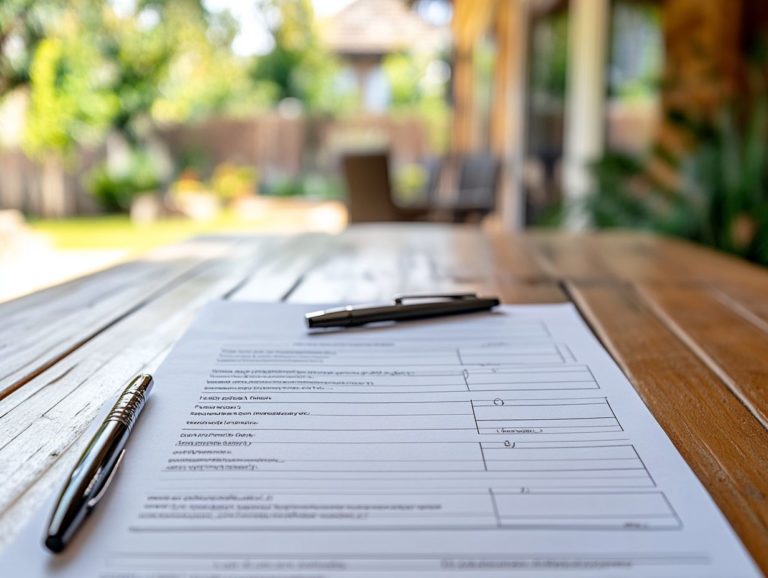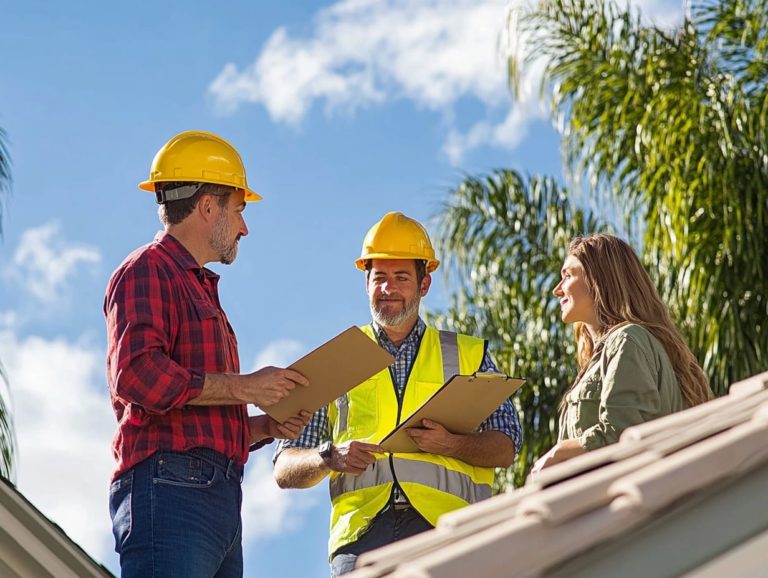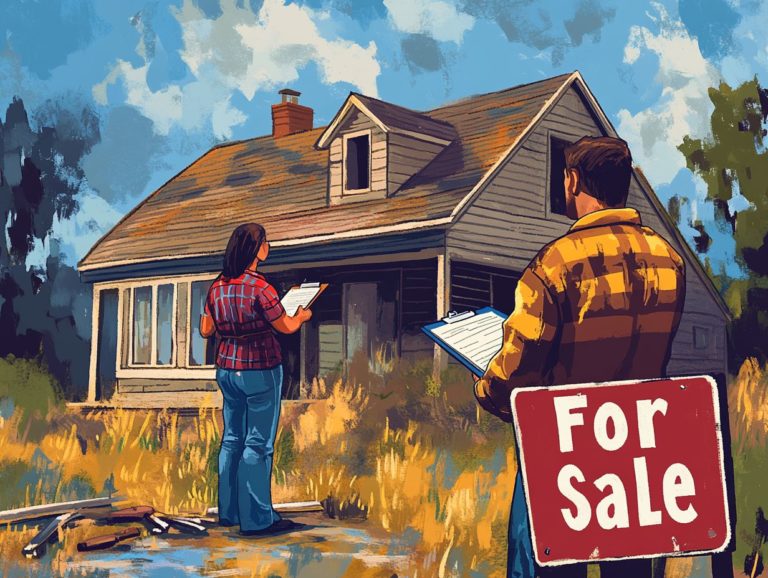How to Understand Home Inspection Fees
When you re navigating the buying or selling of a home, understanding the details of home inspections can be your ticket to saving time, money, and a fair share of stress.
Home inspections are important for finding potential problems that could impact your investment.
This article delves into the significance of these inspections, the various factors that influence their fees, what you can expect during the process, and how to select the right inspector for your needs. It also offers valuable tips for negotiating costs, ensuring you re thoroughly prepared for this essential milestone in your real estate journey.
Contents
Key Takeaways:
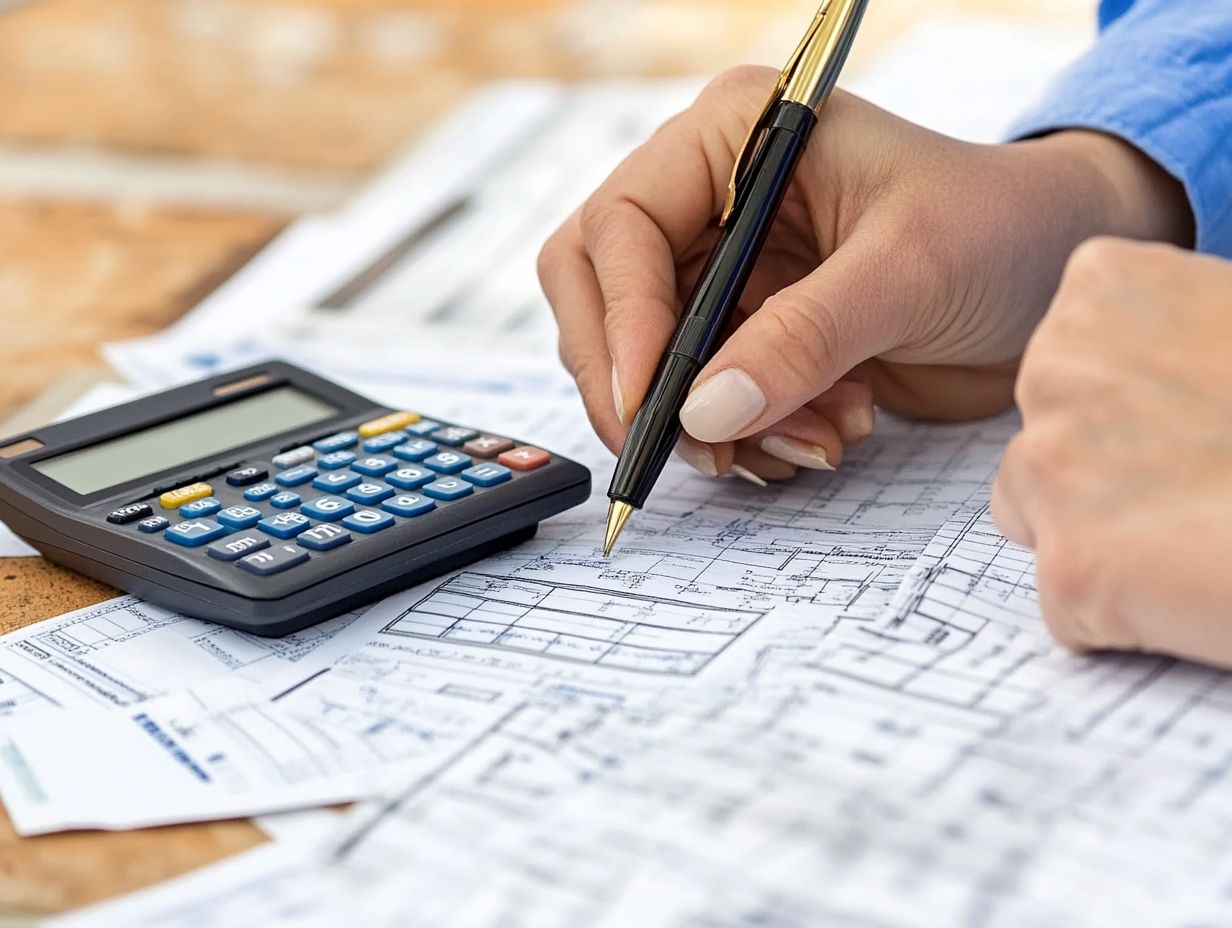
Home inspections are crucial for identifying potential problems and ensuring the safety and value of a home.
Factors such as size, age, location, and additional services can impact the cost of a home inspection.
When choosing a home inspector, look for qualifications and experience, and consider negotiating for better fees.
The Importance of Home Inspections
Home inspections are vital in the real estate process, especially for you as a homebuyer aiming to make informed decisions about your future property.
These inspections help uncover safety hazards and offer a thorough visual assessment of the home s condition. This is crucial for recognizing potential hidden costs and ensuring transparency throughout the transaction.
The inspection report details critical aspects that can greatly influence your negotiation strategy. It grants you a competitive edge in a dynamic market where property inspections are frequently overlooked.
Why Home Inspections are Necessary
Home inspections serve several essential purposes, such as uncovering hidden costs and ensuring your expectations are met throughout the property buying journey.
These assessments do more than just highlight potential safety hazards; they also offer valuable insights into the overall condition of the property.
By understanding these hidden elements, you can negotiate more favorable terms, potentially saving significant sums on future repairs. When professionals adhere to inspection protocols, they ensure compliance with regulatory standards, which builds your confidence as a buyer.
Ultimately, comprehensive evaluations are crucial in promoting transparency and empowering you to make informed decisions that align with both your financial goals and personal aspirations.
Factors that Affect Home Inspection Fees
Home inspection fees are influenced by several key factors, and they can vary significantly depending on the pricing methods used by inspectors and the specific services included in the evaluation. It’s crucial for both homebuyers and inspectors to grasp these elements, including understanding home inspection costs.
Pricing is impacted by aspects such as the size of the property, local market rates, and any additional services like testing for a harmful gas that can come from the ground or termite inspections that may be required.
The inspector’s overhead costs also play a role, all of which combine to determine the final inspection fee. Understanding home inspection fees can empower you as you navigate the home inspection process.
Size and Age of the Home
The size and age of a home play a pivotal role in determining inspection costs. Larger properties often demand more extensive evaluations, which can lead to higher fees.
When you’re considering a home inspection, remember that larger homes generally mean more square footage to assess. This can extend the time required for a thorough evaluation.
In contrast, older homes may pose unique challenges due to outdated systems or structural issues. These often necessitate specialized expertise from inspectors.
This interplay of size and age shapes pricing structures in a competitive market and influences your client experience. Detailed reports and recommendations for repairs or upgrades can vary significantly based on these factors.
Ultimately, investing in a comprehensive inspection for larger or older properties can be a smart move, potentially saving you from unforeseen future costs.
Location and Accessibility
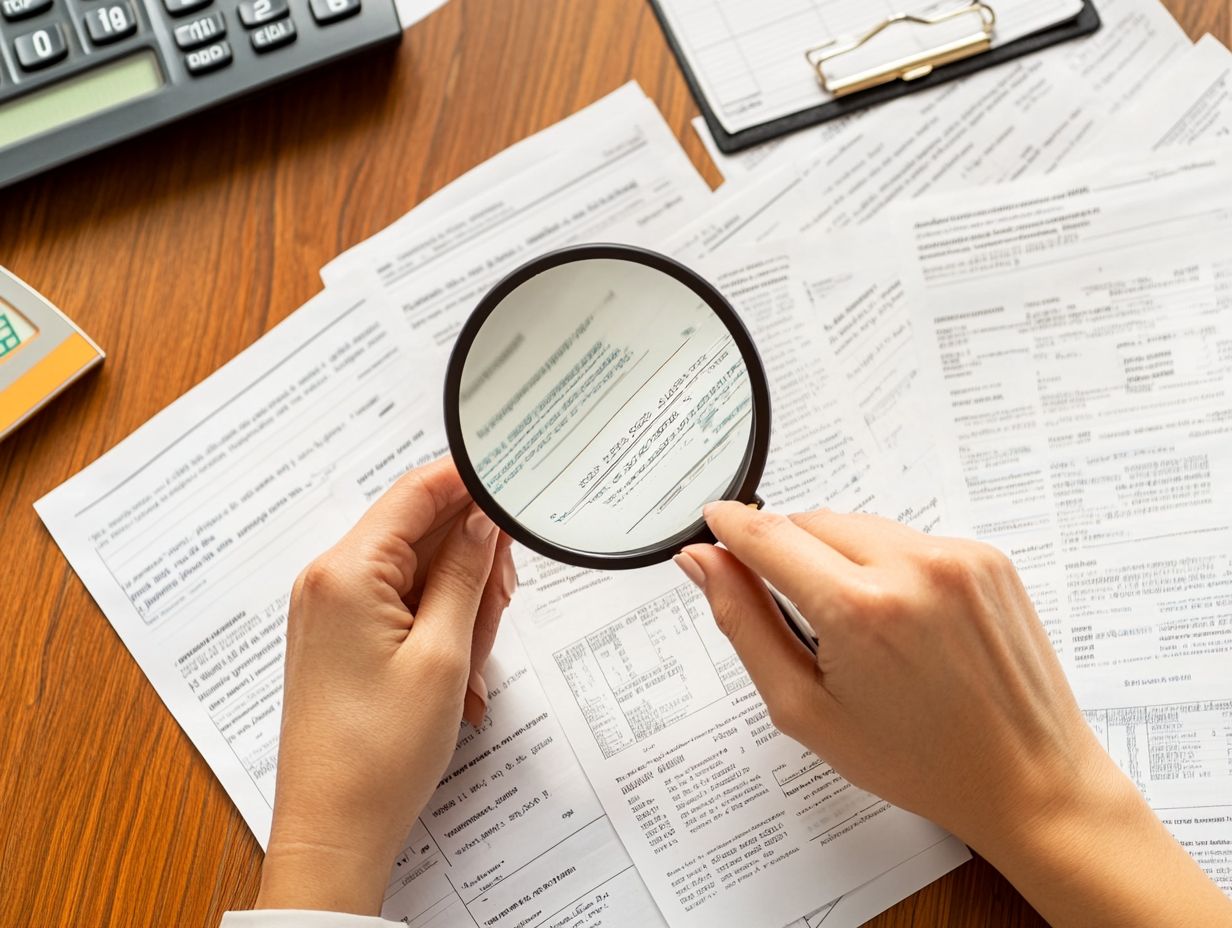
Location and accessibility significantly influence home inspection fees. Affluent areas often command higher costs due to increased demand and elevated property values.
This dynamic creates a competitive landscape where you, as a service provider, must not only meet but strive to exceed client expectations shaped by their environments.
In regions facing environmental challenges, such as those susceptible to flooding or wildfires, specialized assessments may be necessary, which can inflate costs. The ease of access to properties impacts scheduling and the thoroughness of inspections, ultimately shaping how clients perceive value.
When geographical challenges complicate inspections, both you and your clients must consider how these factors affect pricing and the overall efficiency of the inspection process.
Additional Services and Add-ons
Additional services and add-ons, like radon testing and termite inspection, can considerably elevate the total cost of a home inspection. It’s essential for you, as a homebuyer, to know exactly what you need.
These supplementary evaluations provide a deeper understanding of the property’s condition, focusing on potential hidden dangers that could impact your safety and comfort.
For example, radon testing is vital due to the health risks linked to elevated levels of this tasteless, odorless gas. Meanwhile, a termite inspection can uncover destructive infestations that might jeopardize your home’s structural integrity.
Clients often anticipate comprehensive examinations that go beyond the basics, making these extras essential for informed decision-making.
Consider weighing your safety concerns against your budget. Each additional service adds to your cost but can bring invaluable peace of mind.
What is Typically Included in a Home Inspection
A home inspection generally involves a careful look at the property’s key areas and systems.
This comprehensive examination culminates in a detailed inspection report tailored for your understanding, ensuring you are well-informed about the condition of your potential new home.
Standard Areas and Systems Covered
In a home inspection, standard areas covered include major systems like HVAC (Heating, Ventilation, and Air Conditioning), plumbing, and electrical systems, ensuring that safety hazards are identified.
These components are essential for maintaining your home’s functionality and comfort, as they affect air quality, water supply, and power distribution. The HVAC system is vital for climate control, creating a livable environment. Meanwhile, the plumbing infrastructure protects against leaks or water damage, which could lead to serious structural issues.
It’s equally important to evaluate the electrical systems for safety and code compliance, as this helps prevent potential fire hazards. Each of these areas is carefully documented in the inspection report, giving you the power to make informed decisions and prioritize any necessary repairs or upgrades.
How to Choose a Home Inspector
Selecting the ideal home inspector requires careful examination of their qualifications and experience. You want to ensure they have the expertise to perform a comprehensive evaluation of the property, leaving no stone unturned.
Qualifications and Experience to Look For

When searching for a home inspector, it s crucial to evaluate their qualifications, such as certifications from esteemed industry organizations like ASHI, NACHI, or NAHI. These certifications signify a commendable level of expertise that you would want on your side.
A well-rounded experience in various property inspections, spanning both residential and commercial domains, significantly enhances an inspector’s ability to pinpoint potential issues. Ideally, inspectors should have a robust background in construction or engineering; this foundation enables them to assess structural integrity with greater precision.
Years of hands-on experience often reflect a dedication to continuous learning and a keen awareness of current industry standards, allowing them to detect subtle signs of trouble that less experienced professionals might easily overlook.
Understanding the Cost of Home Inspection
Grasping the cost of a home inspection is essential for you as a homebuyer. Average fees can fluctuate significantly based on the pricing model employed and the particular services included in the inspection, so understanding home inspection fees and costs is crucial.
Average Fees and What They Cover
Average fees for home inspections can vary based on the services provided. Typically, this includes a comprehensive inspection report that meticulously details the property’s condition, so it’s important to understand the cost of home inspections before making a decision.
This report often includes evaluations of major systems such as plumbing, electrical, roofing, and HVAC (Heating, Ventilation, and Air Conditioning). These evaluations ensure that potential issues are identified before you finalize a purchase.
Home inspectors may also offer additional services like radon testing or mold assessments, which can certainly influence the overall cost.
As you navigate this landscape, competitive pricing becomes crucial. Comparing different inspectors and their offerings can help you make informed decisions.
By understanding the average fees and the associated services, you can ensure that you receive both quality and value throughout your home-buying journey.
Tips for Negotiating Home Inspection Fees
Negotiating home inspection fees is a valuable skill for homebuyers. By grasping the details of the market and understanding the process of home inspections, you can achieve substantial pricing adjustments that align seamlessly with your expectations.
What to Ask For and How to Save Money
When you’re negotiating home inspection fees, it’s essential to know what to ask for. Many inspectors are quite open to adjusting their pricing, especially if you understand the cost breakdown of home inspections, which can significantly enhance your overall experience.
Understanding the details of their pricing structure is key. Be sure to inquire about any optional services that might not be included in the standard fee; these can sometimes be bundled at a lower cost.
Don t hesitate to ask inspectors how their pricing compares to competitors. This could open doors to discounts, as some may offer reduced rates during off-peak seasons or even match the prices of others in the market.
By engaging in this conversation with thoughtful questions, you can often uncover hidden savings and craft a win-win scenario. Start negotiating now to save money!
Frequently Asked Questions

What are home inspection fees and why do I need to pay for them?
Home inspection fees refer to the cost of hiring a professional home inspector to thoroughly assess the condition of a property before purchase. It is an important step in the home-buying process to ensure that the property is safe, structurally sound, and free of major defects. Understanding the home inspection cost factors can help you prepare for these fees, which cover the time and expertise of the inspector, as well as any specialized equipment used during the inspection.
How much do home inspection fees typically cost?
The cost of home inspection fees can vary depending on factors such as the size and location of the property, as well as the experience and credentials of the inspector. On average, home inspection fees range from $300 to $500, but for those looking to delve deeper into the process, it’s important to understand the home inspection process for buyers, as fees can be higher for larger or more complex properties.
Are there any additional costs I should be aware of?
In addition to the home inspection fees, there may be additional costs for specialized inspections or tests, such as radon or mold testing. These may be recommended by the inspector based on their findings during the initial inspection. It is important to discuss these potential costs with the inspector before the inspection begins.
Can I negotiate the home inspection fees?
It is not uncommon for homebuyers to negotiate the home inspection fees with the inspector or their real estate agent. However, keep in mind that a thorough and comprehensive inspection is crucial for your peace of mind and the overall safety and value of the property. Understanding the basics of home inspections may help you realize that it may not be worth compromising on the quality of the inspection to save a small amount on fees.
Do I need to be present during the home inspection?
While it is not required for you to be present during the home inspection, it is highly recommended. This allows you to ask questions, discuss any concerns with the inspector, and gain a better understanding of the property. It also gives you the opportunity to see any potential issues firsthand.
What Happens After the Home Inspection?
Once the home inspection is finished, you will receive a detailed report of the inspector’s findings. This report is key for making a smart decision about the property.
If major issues arise, you can request repairs or decide to walk away from the purchase. Make sure to act quickly, as this will impact your buying process!

